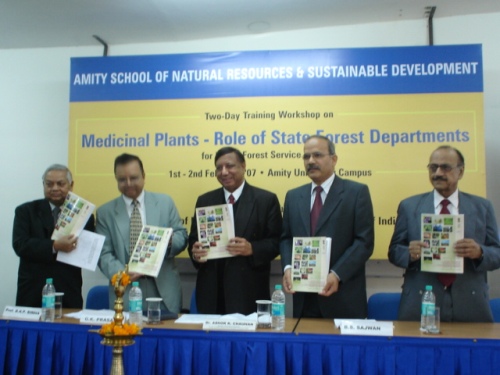01 Feb 2007-02 Feb 2007|Noida | Amity University Campus, Sector-125, Noida
Training Workshop for Senior IFS Officers inaugurated at Amity School of Natural Resources & Sustainable Development
 Amity School of Natural Resources & Sustainable Development, organized a 2-day training workshop for IFS officers, sponsored by the Ministry of Environment & Forests, Government of India on “Medicinal Plants – Role of State Forest Departments in Conservation, Cultivation, Harvesting, Marketing and Benefit Sharing by the Communities”
Amity School of Natural Resources & Sustainable Development, organized a 2-day training workshop for IFS officers, sponsored by the Ministry of Environment & Forests, Government of India on “Medicinal Plants – Role of State Forest Departments in Conservation, Cultivation, Harvesting, Marketing and Benefit Sharing by the Communities” from February 01-02, 2007 at Amity University Campus, Noida. About 45 Senior Indian Forest Service from the ranks of Chief Conservator of Forests to Additional Principal Chief Conservator of Forests are attending this workshop from all over India including Gujarat, Sikkim, Jharkhand, Uttaranchal, West Bengal, Maharashtra, Uttar Pradesh, Karnataka, Madhya Pradesh, Andaman and Nicobar, Orissa, Andhra Pradesh, Assam, etc.
Inaugurating the workshop
Mr. G.K. Prasad, Director General (Forests), Ministry of Environment & Forests, Government of India and Chief Guest of the occasion remarked, “India has one of the largest medicinal plant resource and abounds in valuable species throughout its length and sweep. Valuable plants are found in the forests of Uttaranchal, Himachal Pradesh, Jammu & Kashmir, Kerala, Madhya Pradesh, North Easters States and Gujarat. These have been indiscriminately harvested by the local inhabitants and collectors due to their immense medicinal and market potential. Such unscientific collection and removal from their natural habitat has pushed them to the brink of extinction. Plants like Saraca Asoka (Asoka), Pterocarpus marsupium(Rakta Chandan), Valeriana walichii (Tagara), Nardostachys jatamansi (Jatamansi), Swertia chirayta (Chirata), Saussurea costus (Kushta), Picrorrhiza kurroa (Kutki), Aconitum heterophyllum (Ativisha), Taxus baccata (Pacific Yew) and numerous others have found a place in the IUCN (International Union for Conservation of Nature) Red Data Book, either as extremely vulnerable or endangered species. Today forests are depleting due to developmental projects and other man made disasters. Need of the hour is to see how we can retain this wealth and yet be progressive.”
Dr. B.S. Sajwan, Chief Executive Officer, National Medicinal PlantsBoard and Guest of Honour of the occasion speaking on the objectives of the training workshop stated, “Medicinal plants are an extremely important resource and part of our national heritage. Since time immemorial, the ancient Ayurvedic Vaidyas, Siddha and Unani physicians have identified, collected and used these herbs in various forms fore treating the most simple to complex ailments like cancer, in human and even animals. Indeed the power of herbs has surpassed all forms of modern medication, in terms of relief and cure of all forms of diseases. Modern systems of medicine, Homeopathy, Chinese, Tibetan, African, Egyptian and others all have used plants for natural cure. Some very common names like, asafoetida, turmeric, neem, amla, cumin, tulsi, belladonna, sarpagandha, ashwagandha etc. are known to all and even find a place in our kitchen shelf. With such a wide variety of stake holders and each assuming ownership of the medicinal plant resource in its own right, we feel that there is a great discord, confusion and milieu in this important issue of conservation and utilization. This workshop has been design to sensitize the top brass and preserve our national wealth.”
Dr. Ashok K. Chauhan, Founder President, Ritnand Balved Education Foundation (RBEF) said, “Medicinal Plant diversity in our country is an important part of our national wealth. However with indiscriminate harvesting and over exploitation, certain medicinal plants specially occurring in the higher Himalayan tracts are dangerously under the threat of extinction. Indeed the alarming situation calls for some serious brain storming on ways and means to not only conserve but also propagate these plants so that they are available for posterity. The Forest department has long been the custodian of this very important resou